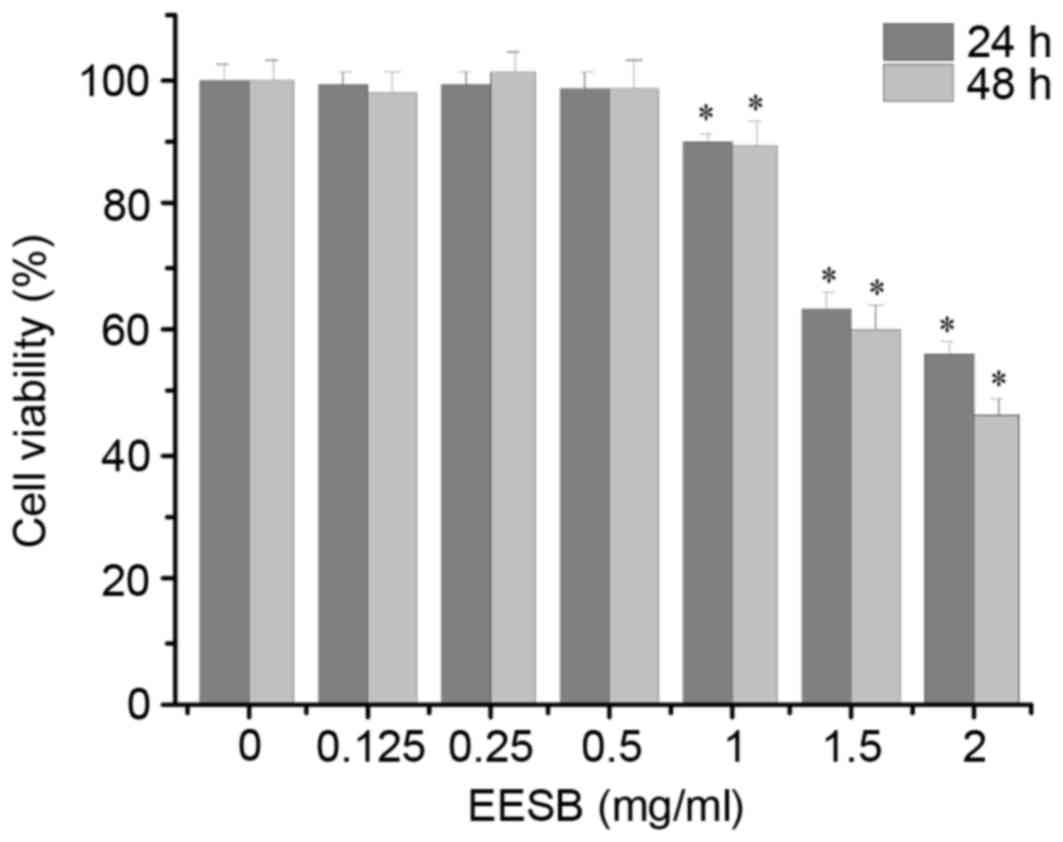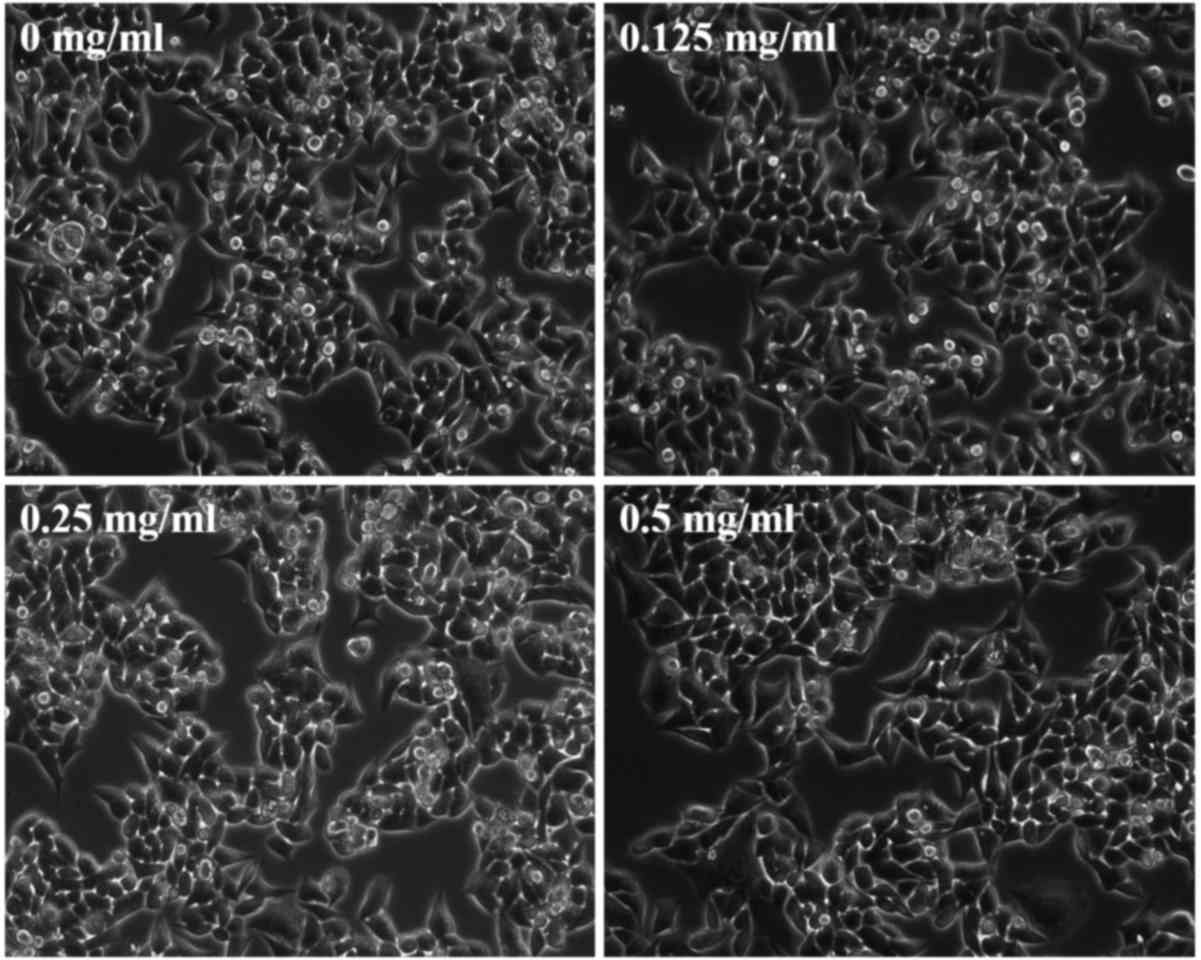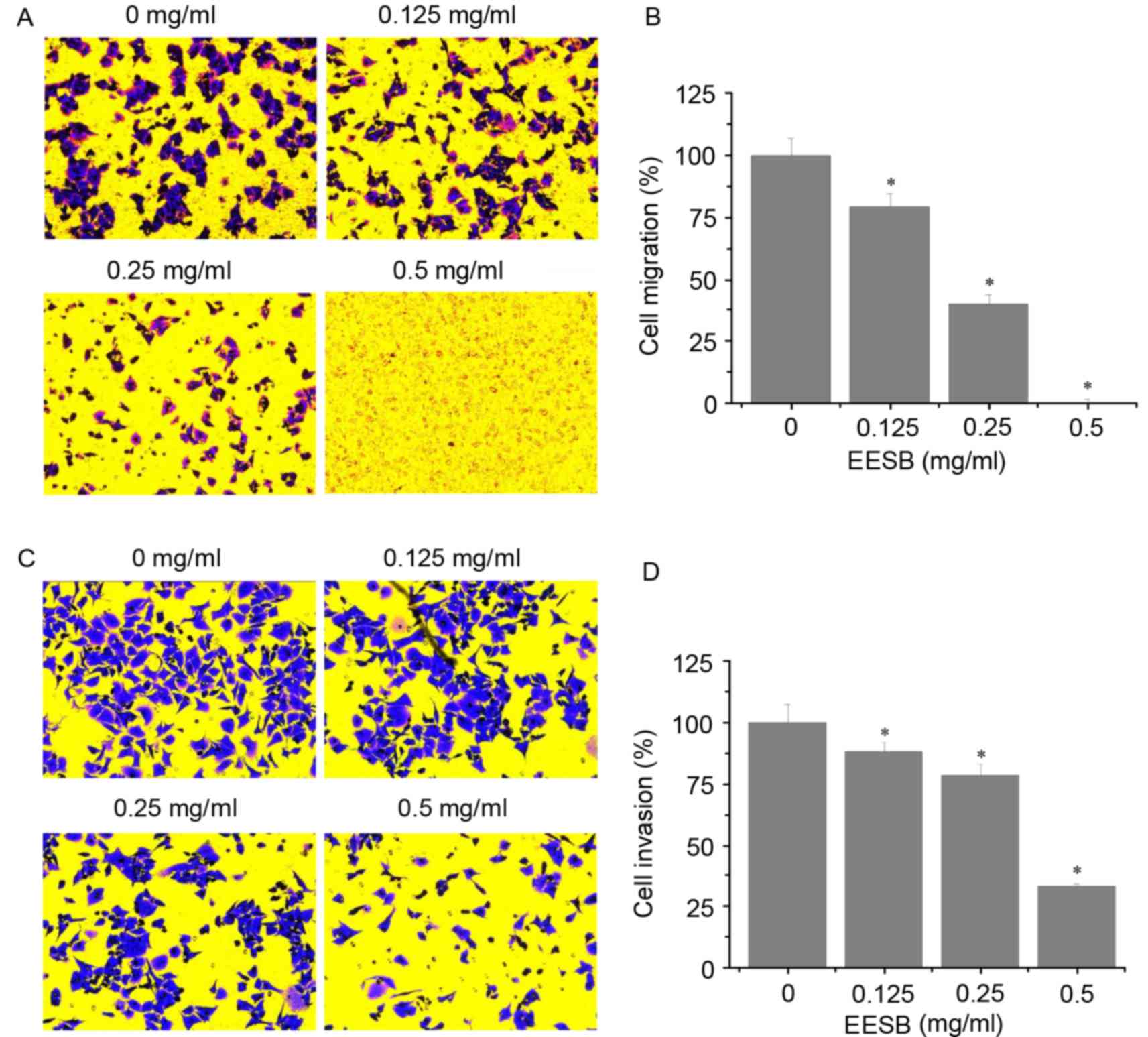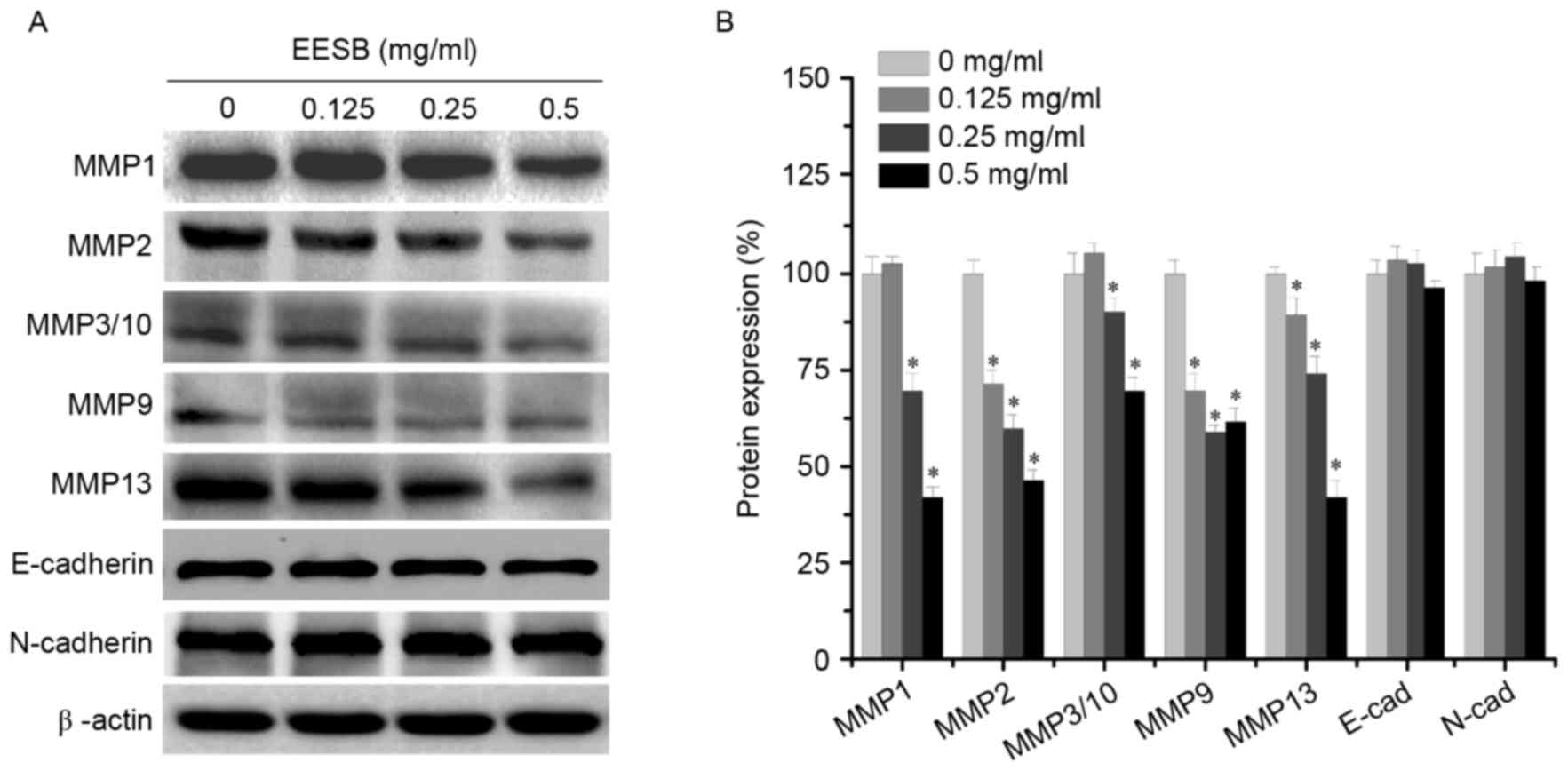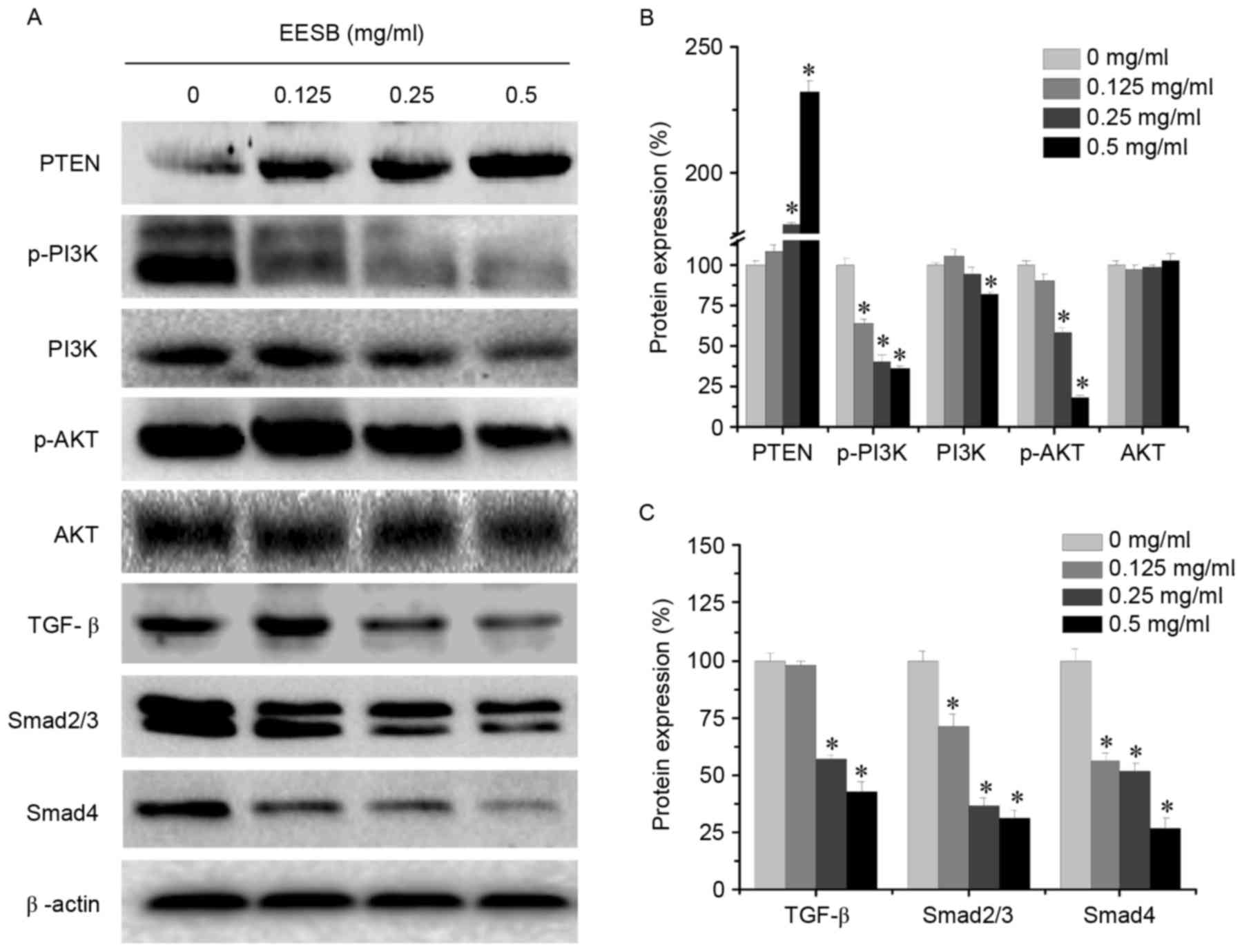|
1
|
Tenesa A and Dunlop MG: New insights into
the aetiology of colorectal cancer from genome-wide association
studies. Nat Rev Genet. 10:353–358. 2009. View Article : Google Scholar : PubMed/NCBI
|
|
2
|
Siegel R, Ma J, Zou Z and Jemal A: Cancer
statistics, 2014. CA Cancer J Clin. 64:9–29. 2014. View Article : Google Scholar : PubMed/NCBI
|
|
3
|
Grávalos C, Cassinello J, Fernández-Rañada
I and Holgado E: Role of tyrosine kinase inhibitors in the
treatment of advanced colorectal cancer. Clin Colorectal Cancer.
6:691–699. 2007. View Article : Google Scholar : PubMed/NCBI
|
|
4
|
Brenner H, Kloor M and Pox CP: Colorectal
cancer. Lancet. 383:1490–1502. 2014. View Article : Google Scholar : PubMed/NCBI
|
|
5
|
Van Cutsem E and Oliveira J: ESMO
Guidelines Working Group: Advanced colorectal cancer: ESMO clinical
recommendations for diagnosis, treatment and follow-up. Ann Oncol.
20 Suppl 4:S61–S63. 2009. View Article : Google Scholar
|
|
6
|
Manfredi S, Lepage C, Hatem C, Coatmeur O,
Faivre J and Bouvier AM: Epidemiology and management of liver
metastases from colorectal cancer. Ann Surg. 244:254–259. 2006.
View Article : Google Scholar : PubMed/NCBI
|
|
7
|
Talmadge JE and Fidler IJ: AACR centennial
series: The biology of cancer metastasis: Historical perspective.
Cancer Res. 70:5649–5669. 2010. View Article : Google Scholar : PubMed/NCBI
|
|
8
|
Shen A, Lin W, Chen Y, Liu L, Chen H,
Zhuang Q, Lin J, Sferra TJ and Peng J: Pien Tze Huang inhibits
metastasis of human colorectal carcinoma cells via modulation of
TGF-β1/ZEB/miR-200 signaling network. Int J Oncol. 46:685–690.
2015. View Article : Google Scholar : PubMed/NCBI
|
|
9
|
Kalluri R and Weinberg RA: The basics of
epithelial-mesenchymal transition. J Clin Invest. 119:1420–1428.
2009. View
Article : Google Scholar : PubMed/NCBI
|
|
10
|
Xu T, Jing C, Shi Y, Miao R, Peng L, Kong
S, Ma Y and Li L: microRNA-20a enhances the
epithelial-to-mesenchymal transition of colorectal cancer cells by
modulating matrix metalloproteinases. Exp Ther Med. 10:683–688.
2015. View Article : Google Scholar : PubMed/NCBI
|
|
11
|
Alam SK, Yadav VK, Bajaj S, Datta A, Dutta
SK, Bhattacharyya M, Bhattacharya S, Debnath S, Roy S, Boardman LA,
et al: DNA damage-induced ephrin-B2 reverse signaling promotes
chemoresistance and drives EMT in colorectal carcinoma harboring
mutant p53. Cell Death Differ. 23:707–722. 2016. View Article : Google Scholar : PubMed/NCBI
|
|
12
|
Guo S: Research progress in the mechanism
of colorectal cancer metastasis. J Mudanjiang Med College.
29:65–67. 2008.
|
|
13
|
Juchniewicz A, Kowalczuk O, Milewski R,
Laudański W, Dzięgielewski P, Kozłowski M and Nikliński J: MMP-10,
MMP-7, TIMP-1 and TIMP-2 mRNA expression in esophageal cancer. Acta
Biochim Pol. 64:295–299. 2017. View Article : Google Scholar : PubMed/NCBI
|
|
14
|
Yun EJ, Song KS, Shin S, Kim S, Heo JY,
Kweon GR, Wu T, Park JI and Lim K: Docosahexaenoic acid suppresses
breast cancer cell metastasis by targeting
matrix-metalloproteinases. Oncotarget. 7:49961–49971. 2016.
View Article : Google Scholar : PubMed/NCBI
|
|
15
|
Dou CY, Cao CJ, Wang Z, Zhang RH, Huang
LL, Lian JY, Xie WL and Wang LT: EFEMP1 inhibits migration of
hepatocellular carcinoma by regulating MMP2 and MMP9 via ERK1/2
activity. Oncol Rep. 35:3489–3495. 2016. View Article : Google Scholar : PubMed/NCBI
|
|
16
|
Fuksiewicz M, Kotowicz B, Rutkowski A and
Kowalska M: The matrix metalloproteinase-7 and pro-enzyme of
metalloproteinase-1 as a potential marker for patients with rectal
cancer without distant metastasis. Tumour Biol. 36:3629–3635. 2015.
View Article : Google Scholar : PubMed/NCBI
|
|
17
|
Zhang M, Zhuo N and Guo Z: Molecular
mechanism of epithelial-mesenchymal transition and its role in
tumor metastasis. Chin Med Herald. 11:163–165. 2014.
|
|
18
|
Wei F, Shen Q and Liu C: Phenethyl
isothiocyanate inhibits PI3K/NF-kB to down-regulate MMP-9
expression in human colon cancer cells. Med Sci J Central South
China. 42:351–354. 2014.
|
|
19
|
Liang S, Lv Y and Wang X: Study of the
correlation and expression of focal adhesion kinase and matrix
metalloproteinase-9 in colorectal carcinoma. J Colorectal Anal
Surger. 14:157–160. 2008.
|
|
20
|
Gordaliza M: Natural products as leads to
anticancer drugs. Clin Transl Oncol. 9:767–776. 2007. View Article : Google Scholar : PubMed/NCBI
|
|
21
|
Zhao J, Jiang P and Zhang W: Molecular
networks for the study of TCM pharmacology. Brief Bioinform.
11:417–430. 2010. View Article : Google Scholar : PubMed/NCBI
|
|
22
|
Lin J, Chen Y, Wei L, Chen X, Xu W, Hong
Z, Sferra TJ and Peng J: Hedyotis Diffusa Willd extract induces
apoptosis via activation of the mitochondrion-dependent pathway in
human colon carcinoma cells. Int J Oncol. 37:1331–1338.
2010.PubMed/NCBI
|
|
23
|
Demain AL and Zhang L: Natural Products
and Drug Discovery. Can thousands of years of ancient medical
knowledge lead us to new and powerful drug combinations in the
fight against cancer and dementia? EMBO Rep. 10:194–200. 2009.
View Article : Google Scholar : PubMed/NCBI
|
|
24
|
Shen AL, Hong F, Liu LY, Lin JM, Zhuang
QC, Hong ZF and Peng J: Effects of Pien Tze Huang on angiogenesis
in vivo and in vitro. Chin J Integr Med. 18:431–436. 2012.
View Article : Google Scholar : PubMed/NCBI
|
|
25
|
Read BE: The Chinese Pharmacopoeia. Can
Med Assoc J. 23:568–570. 1930.PubMed/NCBI
|
|
26
|
Cha YY, Lee EO, Lee HJ, Park YD, Ko SG,
Kim DH, Kim HM, Kang IC and Kim SH: Methylene chloride fraction of
Scutellaria barbata induces apoptosis in human U937 leukemia cells
via the mitochondrial signaling pathway. Clin Chim Acta. 348:41–48.
2004. View Article : Google Scholar : PubMed/NCBI
|
|
27
|
Lin J, Chen Y, Cai Q, Wei L, Zhan Y, Shen
A, Sferra TJ and Peng J: Scutellaria barbata D Don inhibits
colorectal cancer growth via suppression of multiple signaling
pathways. Integr Cancer Ther. 13:240–248. 2014. View Article : Google Scholar : PubMed/NCBI
|
|
28
|
Suh SJ, Yoon JW, Lee TK, Jin UH, Kim SL,
Kim MS, Kwon DY, Lee YC and Kim CH: Chemoprevention of Scutellaria
bardata on human cancer cells and tumorigenesis in skin cancer.
Phytother Res. 21:135–141. 2007. View
Article : Google Scholar : PubMed/NCBI
|
|
29
|
Yin X, Zhou J, Jie C, Xing D and Zhang Y:
Anticancer activity and mechanism of Scutellaria barbata extract on
human lung cancer cell line A549. Life Sci. 75:2233–2244. 2004.
View Article : Google Scholar : PubMed/NCBI
|
|
30
|
Lee TK, Lee DK, Kim DI, Lee YC, Chang YC
and Kim CH: Inhibitory effects of Scutellaria barbata D. Don on
human uterine leiomyomal smooth muscle cell proliferation through
cell cycle analysis. Int Immunopharmacol. 4:447–454. 2004.
View Article : Google Scholar : PubMed/NCBI
|
|
31
|
Wei L, Chen Y, Lin J, Zhao J, Chen X, Xu
W, Liu X, Sferra T and Peng J: Scutellaria barbata D. Don induces
apoptosis of human colon carcinoma cell through activation of the
mitochondrion-dependent pathway. J Med Plants Res. 5:1962–1970.
2011.
|
|
32
|
Wei L, Lin J, Wu G, Xu W, Li H, Hong Z and
Peng J: Scutellaria barbata D. Don induces G1/S arrest via
modulation of p53 and Akt pathways in human colon carcinoma cells.
Oncol Rep. 29:1623–1628. 2013. View Article : Google Scholar : PubMed/NCBI
|
|
33
|
Georgescu MM: PTEN tumor suppressor
network in PI3K-Akt pathway control. Genes Cancer. 1:1170–1177.
2010. View Article : Google Scholar : PubMed/NCBI
|
|
34
|
Rodel C, Hofheinz R and Liersch T: Rectal
cancer: State of the art in 2012. Curr Opin Oncol. 24:441–447.
2012. View Article : Google Scholar : PubMed/NCBI
|
|
35
|
Cunningham D, Atkin W, Lenz HJ, Lynch HT,
Minsky B, Nordlinger B and Starling N: Colorectal cancer. Lancet.
375:1030–1047. 2010. View Article : Google Scholar : PubMed/NCBI
|
|
36
|
Tan P, Lu B and Bao W: Analysis on the
clinical application of Scutellaria barbata D. Don in the
anti-cancer therapy. Jiangxi Tradit China Med. 37:57–58. 2006.
|
|
37
|
Dai ZJ, Liu XX, Tang W, Xue Q, Wang XJ, Ji
ZZ, Kang HF and Diao Y: Antitumor and immune-modulating effects of
Scutellaria barbata extract in mice bearing hepatocarcinoma H22
cells-derived tumor. Nan Fang Yi Ke Da Xue Xue Bao. 28:1835–1837.
2008.(In Chinese). PubMed/NCBI
|
|
38
|
Goh D, Lee YH and Ong ES: Inhibitory
effects of a chemically standardized extract from Scutellaria
barbata in human colon cancer cell lines, LoVo. J Agric Food Chem.
53:8197–8204. 2005. View Article : Google Scholar : PubMed/NCBI
|
|
39
|
Marconett CN, Morgenstern TJ, San Roman
AK, Sundar SN, Singhal AK and Firestone GL: BZL101, a phytochemical
extract from the Scutellaria barbata plant, disrupts proliferation
of human breast and prostate cancer cells through distinct
mechanisms dependent on the cancer cell phenotype. Cancer Biol
Ther. 10:397–405. 2010. View Article : Google Scholar : PubMed/NCBI
|
|
40
|
Wong BY, Nguyen DL, Lin T, Wong HH,
Cavalcante A, Greenberg NM, Hausted RP and Zheng J: Chinese
medicinal herb Scutellaria barbata modulates apoptosis and cell
survival in murine and human prostate cancer cells and tumor
development in TRAMP mice. Eur J Cancer Prev. 18:331–341. 2009.
View Article : Google Scholar : PubMed/NCBI
|
|
41
|
Zhao Z, Holle L, Song W, Wei Y, Wagner TE
and Yu X: Antitumor and anti-angiogenic activities of Scutellaria
barbata extracts in vitro are partially mediated by inhibition of
Akt/protein kinase B. Mol Med Rep. 5:788–792. 2012.PubMed/NCBI
|
|
42
|
Zhang L, Cai Q, Lin J, Fang Y, Zhan Y,
Shen A, Wei L, Wang L and Peng J: Chloroform fraction of
Scutellaria barbata D. Don promotes apoptosis and suppresses
proliferation in human colon cancer cells. Mol Med Rep. 9:701–706.
2014. View Article : Google Scholar : PubMed/NCBI
|
|
43
|
Herszényi L, Hritz I, Lakatos G, Varga MZ
and Tulassay Z: The behavior of matrix metalloproteinases and their
inhibitors in colorectal cancer. Int J Mol Sci. 13:13240–13263.
2012. View Article : Google Scholar : PubMed/NCBI
|
|
44
|
Littlepage LE, Sternlicht MD, Rougier N,
Phillips J, Gallo E, Yu Y, Williams K, Brenot A, Gordon JI and Werb
Z: Matrix metalloproteinases contribute distinct roles in
neuroendocrine prostate carcinogenesis, metastasis, and
angiogenesis progression. Cancer Res. 70:2224–2234. 2010.
View Article : Google Scholar : PubMed/NCBI
|
|
45
|
Laurie AS, Sandra JT and William GS:
Matrix metalloproteinases: Changing roles in tumor progression and
metastasis. Am J Pathol. 181:1895–1899. 2012. View Article : Google Scholar : PubMed/NCBI
|
|
46
|
Gao Y and Wang S: Relationship between
matrix metalloproteinases and their inhibitors and their
relationship with invasion and metastasis of malignant tumors. J
New Med. 42:341–343. 2011.
|
|
47
|
Liu T, Ma Y and Zhang R: Advance research
on relationship between matrix metalloproteinases and invasion and
metastasis of malignant tumors. J Jilin Univ. 30:662–664. 2004.
|
|
48
|
Meng F, Liu X and Qi S: Correlation of
matrix metalloproteinases-2 and-9 in ovarian cancer. Chin J
Gerontology. 33:3505–3506. 2013.
|
|
49
|
Ming S, Sun T and Xiao W: Role of matrix
metalloproteinases −2, −9 and its inhibitor 1 in the invasion and
metastasis of lung cancer. Chin J Respirator Crit Care. 4:198–202.
2005.
|
|
50
|
Zheng H, Shen B, Nie Y and Du Y: The
expression of MMP-9, MMP-13 and TIMP-3 in hepatocellular carcinoma.
Guangdong Med J. 34:1995–1998. 2013.
|
|
51
|
Yan Z, Xu X and Yang G: Abnormal
expression and clinical significance of matrix metalloprteinase 10
in esophagus carcinoma. Ningxia Med J. 27:14–15. 2005.
|
|
52
|
He J, Ding C, He G and Huang Q:
Relationship between expression of ESM-1 and MMP-3 and invasion and
metastasis of human hepatocellular carcinoma. Med Sci J Central
South China. 40:368–372. 2012.
|
|
53
|
Yue X, Zhang Q, Xu A, Xing Y and Zhang F:
Expression and clinical significance of MMP10 and CD105 in patients
with non-small-cell lung carcinoma. Shandong Med J. 49:13–15.
2009.
|
|
54
|
Feng J, Gou W, Liu D and Li X: Expressions
of matrix metalloproteinase-3 and matrix metalloproteinase-10 in
endometrial carcinoma. J Xian Jiaotong Univ (Med Sci). 31:97–101.
2010.
|
|
55
|
Tian J, Xu M and Jing H: Matrix
metalloproteinases 3 and its inhibitory factor 2 expression in lung
squamous carcinoma. West China Med J. 28:369–372. 2013.
|
|
56
|
Ma R and Zhang C: Review of matrix
metalloproteinases-13 and its relationship with invasion and
metastasis of malignant tumor. J Community Med. 10:47–49. 2012.
|
|
57
|
Da C, Liu Y, Zhan Y, Liu K and Wang R:
Nobiletin inhibits epithelial-mesenchymal transition of human
non-small cell lung cancer cells by antagonizing the TGF-β1/Smad3
signaling pathway. Oncol Rep. 35:2767–2774. 2016. View Article : Google Scholar : PubMed/NCBI
|
|
58
|
Ji Q, Liu X, Han Z, Zhou L, Sui H, Yan L,
Jiang H, Ren J, Cai J and Li Q: Resveratrol suppresses
epithelial-to-mesenchymal transition in colorectal cancer through
TGF-β1/Smads signaling pathway mediated Snail/E-cadherin
expression. BMC Cancer. 15:972015. View Article : Google Scholar : PubMed/NCBI
|
|
59
|
Guo L and Wang Q: Correlation of
PI3K/AKT/mTOR signal pathway to infiltration and metastasis of
malignant tumor. Modern Oncol. 17:1585–1589. 2009.
|
|
60
|
Guo C, Ke W, Song K, Wang J, Zhou L and Li
K: PI3K/AKT signalling pathway involves in the modulation of
multidrug resistance and metastasis in breast cancer. Prog Mod
Biomed. 12:4809–4812. 2012.
|
|
61
|
Jia BY and Wang YJ: Metastasis associated
signaling pathway in colorectal cancer. Int J Dig Dis. 3:183–185.
2015.
|
|
62
|
Ding P, Song B and Zhu L: Effect of
TGF-β/Smad 4 on the tumor metastasis of colorectal cancer cells.
Chin J Cancer Prev Treat. 18:1518–1520. 2011.
|
|
63
|
Qi Y and Li H: Research of Qilian Fuzheng
capsule's function on anti-lung cancer metastasis by regulating
TGF-β pathway. Chin Archives Tradit Chin Med. 32:2567–2569.
2014.
|
|
64
|
Liotta LA: Tumor invasion and
metastases-role of the extracellular matrix. Rhoads Memorial Award
lecture. Cancer Res. 46:1–7. 1986.PubMed/NCBI
|
|
65
|
Stetler-Stevenson WG, Hewitt R and
Corcoran M: Matrix metalloproteinases and tumor invasion: From
correlation and causality to the clinic. Semin Cancer Biol.
7:147–154. 1996. View Article : Google Scholar : PubMed/NCBI
|
|
66
|
Chambers AF and Matrisian LM: Changing
views of the role of matrix metalloproteinases in metastasis. J
Natl Cancer Inst. 89:1260–1270. 1997. View Article : Google Scholar : PubMed/NCBI
|
|
67
|
Perera M, Tsang CS, Distel RJ, Lacy JN,
Ohno-Machado L, Ricchiuti V, Samaranayake LP, Smejkal GB, Smith MG,
Trachtenberg AJ and Kuo WP: TGF-beta1 interactome: Metastasis and
beyond. Cancer Genomics Proteomics. 7:217–229. 2010.PubMed/NCBI
|
|
68
|
Roberts AB and Wakefield LM: The two faces
of transforming growth factor beta in carcinogenesis. Proc Natl
Acad Sci USA. 100:pp. 8621–8623. 2003, View Article : Google Scholar : PubMed/NCBI
|















